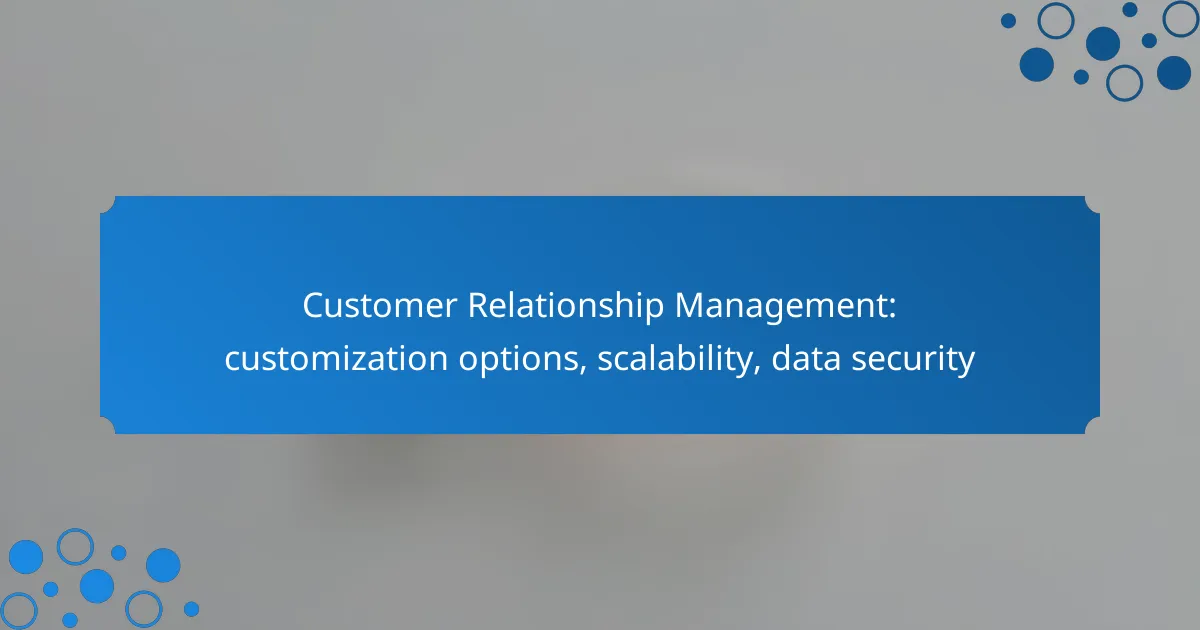Customer Relationship Management (CRM) systems offer essential customization options that enable businesses to tailor their functionalities to specific needs, thereby improving user experience and operational efficiency. As organizations grow, the scalability of these systems becomes crucial, allowing them to manage increased users and data without sacrificing performance. Additionally, robust data security features are vital for safeguarding sensitive customer information, incorporating measures like encryption and compliance with regulations to maintain data integrity and confidentiality.
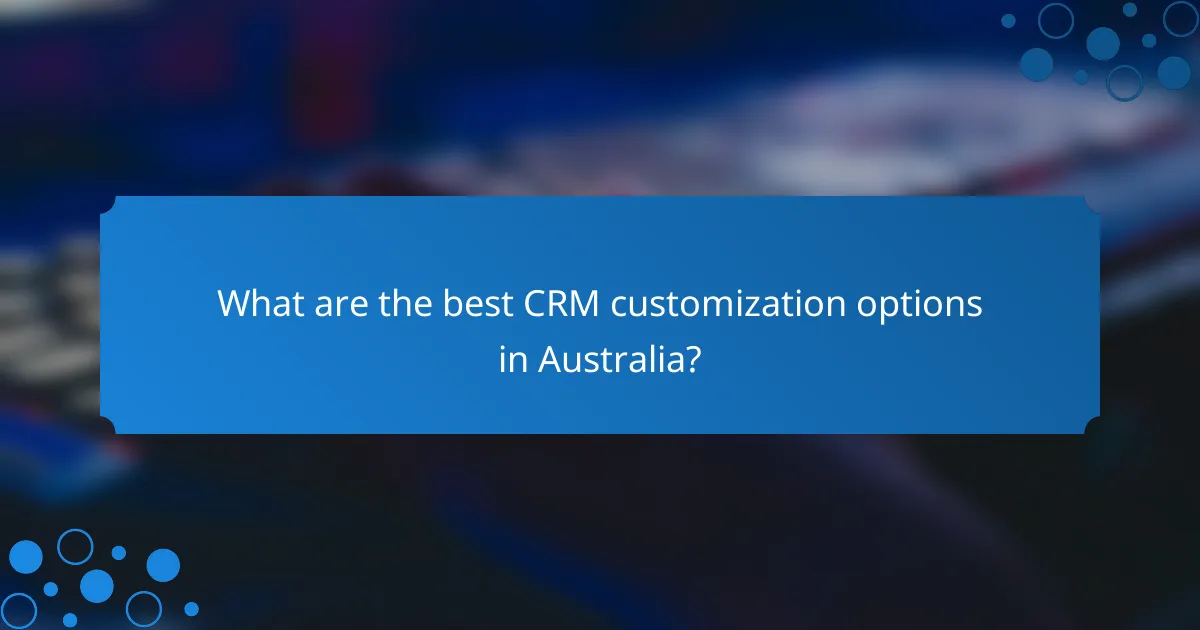
What are the best CRM customization options in Australia?
The best CRM customization options in Australia allow businesses to tailor their systems to meet specific needs, enhancing user experience and operational efficiency. Key platforms like Salesforce, HubSpot, Zoho, and Microsoft Dynamics 365 offer various features that can be adapted based on industry requirements and customer preferences.
Salesforce customization features
Salesforce provides extensive customization options through its AppExchange marketplace, where users can find thousands of third-party applications. Businesses can also create custom objects, fields, and workflows to align the CRM with their unique processes. This flexibility allows companies to scale their CRM as they grow, ensuring it remains relevant to their evolving needs.
Additionally, Salesforce’s Lightning App Builder enables users to design personalized dashboards and user interfaces without extensive coding knowledge. This feature is particularly useful for teams that require specific data visualizations to drive their sales strategies.
HubSpot CRM personalization tools
HubSpot CRM offers a range of personalization tools that allow businesses to customize their customer interactions effectively. Users can create tailored email templates, segment contacts based on behavior, and automate follow-up tasks to enhance engagement. These features help in delivering a more personalized experience to customers, which can lead to higher conversion rates.
Moreover, HubSpot’s reporting tools enable users to customize dashboards to track metrics that matter most to their business. This ensures that teams can focus on key performance indicators relevant to their goals and strategies.
Zoho CRM flexible modules
Zoho CRM stands out for its modular approach, allowing businesses to select and customize only the features they need. Users can add modules for sales automation, marketing, customer support, and analytics, tailoring the CRM to their specific requirements. This flexibility is particularly beneficial for small to medium-sized enterprises looking to optimize their resources.
Additionally, Zoho offers a robust API for further customization, enabling businesses to integrate the CRM with other tools and platforms they use. This ensures a seamless flow of information across systems, enhancing overall productivity.
Microsoft Dynamics 365 customization capabilities
Microsoft Dynamics 365 provides powerful customization capabilities that cater to diverse business needs. Users can customize forms, views, and business rules to create a tailored user experience. The platform also supports custom applications that can be built using Microsoft Power Apps, allowing for extensive adaptability.
Furthermore, Dynamics 365 integrates well with other Microsoft products, such as Office 365 and Azure, providing a cohesive ecosystem for businesses. This integration facilitates data sharing and enhances collaboration across teams, making it a strong choice for organizations already using Microsoft solutions.
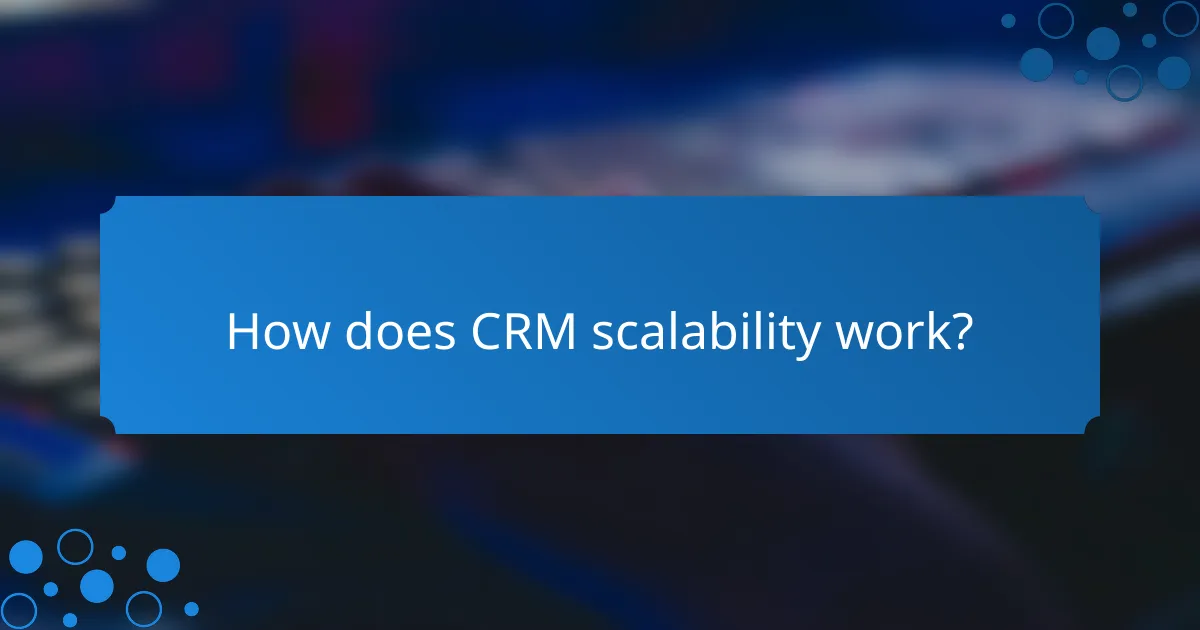
How does CRM scalability work?
CRM scalability refers to the ability of a Customer Relationship Management system to adapt to an organization’s growth and changing needs. This includes accommodating an increasing number of users, data volume, and functionality without compromising performance.
Scalability in Salesforce
Salesforce offers robust scalability options, allowing businesses to expand their CRM capabilities as they grow. Users can start with basic features and gradually add more advanced functionalities, such as automation and analytics, as needed.
Salesforce’s cloud-based infrastructure supports high user volumes and large datasets, making it suitable for small businesses and large enterprises alike. Companies can easily upgrade their plans to access additional features and storage, ensuring that the system evolves with their requirements.
HubSpot CRM growth plans
HubSpot CRM provides scalability through tiered growth plans that cater to different business sizes and needs. The free version is ideal for startups, while paid plans offer enhanced features like marketing automation and advanced reporting.
As businesses grow, they can transition to higher tiers, which unlock additional tools and integrations. This flexibility allows companies to scale their CRM usage without needing to switch platforms, maintaining continuity in their customer management processes.
Zoho CRM tiered pricing structure
Zoho CRM employs a tiered pricing structure that allows organizations to choose a plan that fits their current size and future growth. Each tier offers a different set of features, enabling businesses to select the level of functionality they require.
As companies expand, they can upgrade to higher tiers that provide more advanced capabilities, such as AI-driven insights and enhanced customization options. This approach ensures that businesses only pay for what they need while retaining the ability to scale efficiently.
Microsoft Dynamics 365 scalability options
Microsoft Dynamics 365 offers extensive scalability options tailored for diverse business needs. Its modular design allows organizations to select specific applications that suit their operations, enabling them to scale functionalities as required.
With cloud integration, Dynamics 365 can handle large volumes of data and users, making it suitable for both small businesses and large enterprises. Companies can easily add users and applications, ensuring that their CRM system grows alongside their business demands.
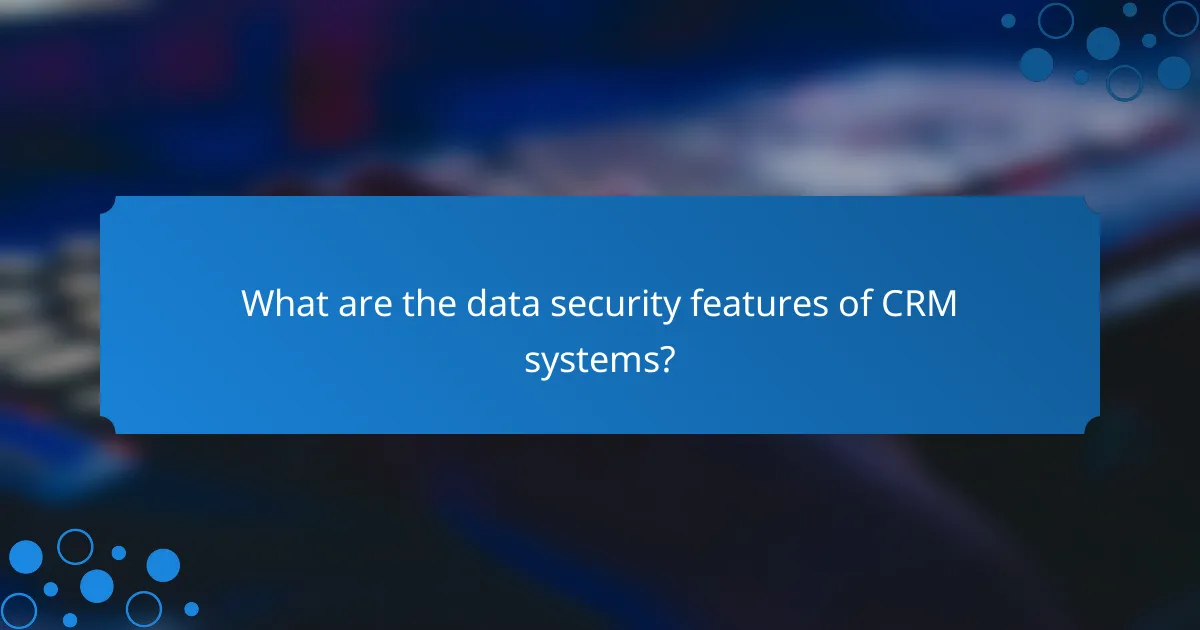
What are the data security features of CRM systems?
Data security features in CRM systems are essential for protecting sensitive customer information. These features typically include encryption, access controls, compliance with regulations, and regular security audits to ensure data integrity and confidentiality.
Salesforce data encryption
Salesforce employs robust data encryption methods to safeguard customer data both at rest and in transit. The platform uses Advanced Encryption Standard (AES) with 256-bit keys, which is a widely accepted standard for securing sensitive information.
Additionally, Salesforce provides customers with the option to manage their own encryption keys, enhancing control over data access. This feature is particularly beneficial for organizations in regulated industries that require stringent data protection measures.
HubSpot CRM security protocols
HubSpot CRM implements a variety of security protocols to protect user data, including two-factor authentication (2FA) and regular security assessments. These measures help to prevent unauthorized access and ensure that only verified users can access sensitive information.
Moreover, HubSpot adheres to industry standards such as the General Data Protection Regulation (GDPR) and the California Consumer Privacy Act (CCPA), ensuring compliance with data protection laws that are crucial for businesses operating in Europe and California.
Zoho CRM compliance certifications
Zoho CRM holds several compliance certifications that demonstrate its commitment to data security. These include ISO 27001, which outlines requirements for an information security management system, and GDPR compliance, which is essential for businesses that handle data from EU citizens.
By maintaining these certifications, Zoho CRM assures users that their data is managed according to best practices in security and privacy, making it a reliable choice for organizations concerned about compliance.
Microsoft Dynamics 365 security measures
Microsoft Dynamics 365 incorporates multiple security measures, including role-based access control and data loss prevention policies. These features ensure that users have access only to the information necessary for their roles, minimizing the risk of data breaches.
Additionally, Dynamics 365 is compliant with various standards such as ISO 27018, which focuses on the protection of personal data in the cloud. This compliance is crucial for businesses that prioritize data privacy and security in their CRM solutions.
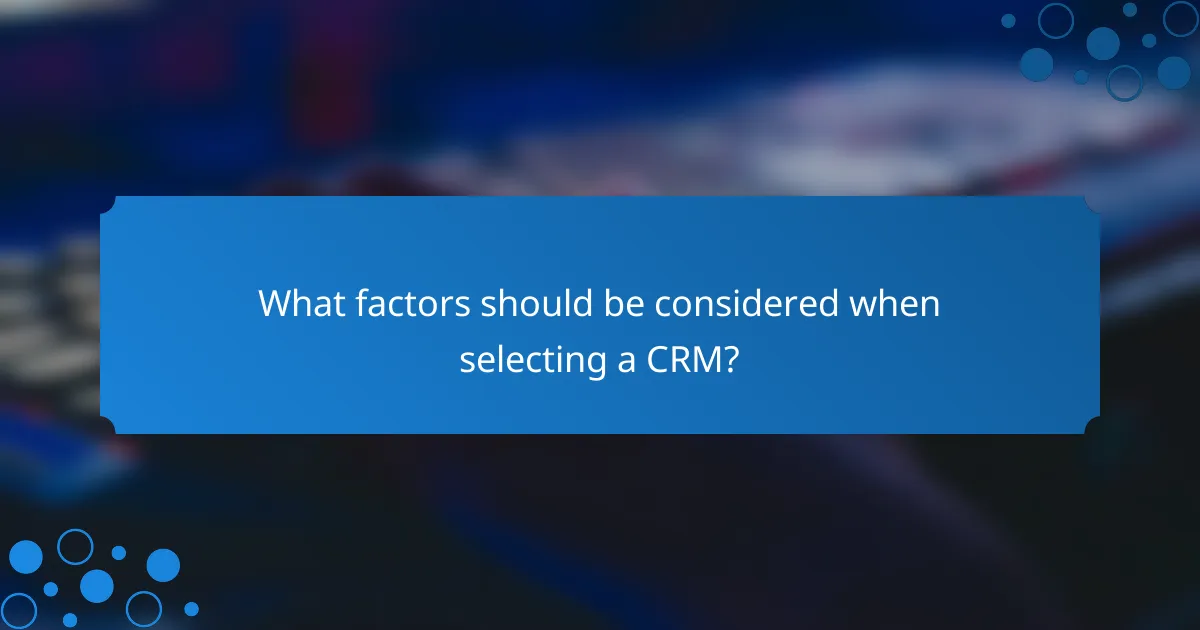
What factors should be considered when selecting a CRM?
When selecting a Customer Relationship Management (CRM) system, key factors include customization options, scalability potential, and data security standards. These elements significantly influence how well the CRM meets your business needs and adapts to future growth.
Customization capabilities
Customization capabilities refer to how well a CRM can be tailored to fit specific business processes and workflows. Look for systems that allow you to modify fields, layouts, and reports to align with your unique requirements.
Consider whether the CRM supports integrations with other tools you use, such as email marketing platforms or project management software. This flexibility can enhance functionality and streamline operations.
Scalability potential
Scalability potential indicates how well a CRM can grow with your business. Choose a system that can handle an increasing number of users, data volume, and additional features without significant performance issues.
Evaluate pricing structures as your team expands. Some CRMs offer tiered pricing based on user count or features, which can be more cost-effective as your business evolves.
Data security standards
Data security standards are crucial for protecting sensitive customer information. Ensure the CRM complies with relevant regulations such as GDPR or CCPA, depending on your location and customer base.
Look for features like encryption, regular security updates, and user access controls. A robust security framework helps mitigate risks associated with data breaches and builds customer trust.
